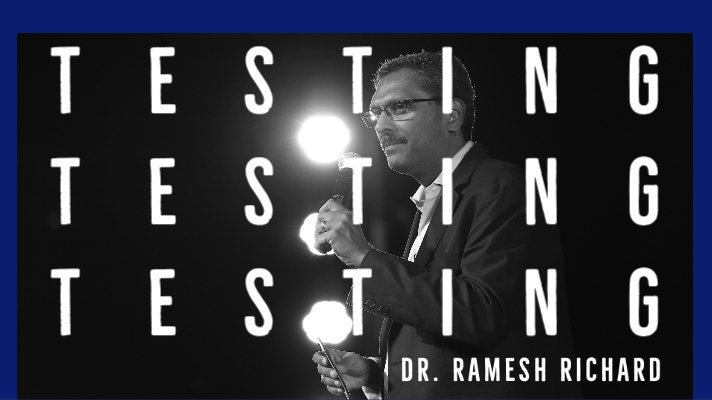
5 Hard Truths About Healthy Church Growth
April 5, 2018
Are You Fully Recognizing Your Realities?
April 12, 2018Empowering Unlikely Leaders

In this episode, Drs. Darrell L. Bock and Gerald McDermott discuss empowering leaders with speech impediments.
Timecodes:
00:15
McDermott’s book Famous Stutterers
09:17
Moses’s case of stuttering
16:48
Aristotle’s and Demosthenes’s cases of stuttering
21:58
Joshua Chamberlain’s case of stuttering
24:34
King George’s case of stuttering
28:54
McDermott’s own experience of stuttering
33:55
Cause of and cure for stuttering
40:14
Marilyn Monroe’s and Annie Glenn’s cases of stuttering
Darrell Bock: Welcome to The Table, where we discuss issues of God and culture. My name is Darrell Bock, executive director for cultural engagement at the Hendricks Center at Dallas Theological Seminary. And my guest is Gerald McDermott, who teaches at Beeson Divinity School. And I’m going to let you lay out your official title and tell us a little bit about the book that we’re going to be talking about.
Gerald McDermott: Sure, Darrell. Thank you very much for having me on. I am the Anglican chair of divinity at Beeson Divinity School. I run the Institute for Anglican Studies here. We train Beeson students for the ministry and various types of ministry and the Anglican Communion, which is a worldwide communion. And I also teach courses on Jonathan Edwards, theology of world religions. And these are all areas in which I have written books and do a lot of lecturing.
So the book that you have graciously agreed to talk with me about is called Famous Stutterers. And the subtitle is Twelve Inspiring People Who Achieved Great Things while Struggling with an Impediment. And I’m going to hold this.
Darrell Bock: Okay, very good. We can see that. Very interesting. I’m almost hesitant to speak now that you’ve mentioned the topic.
But let me ask you one question about your Beeson situation and then we’ll turn to the book. Are there other chairs of other denominations at Beeson or are you the first and only? How does that work?
Gerald McDermott: There is a Presbyterian chair. I mean, Beeson – and I love this about Beeson – it’s interdenominational. Timothy George, the founding dean, is a Baptist. And we have other Baptist professors. But we have Presbyterian professors, we have two Lutheran professors. We have actually seven Anglican professors. And we have one or two other denominations represented. But we are all orthodox, thank God. We are all on the same page in terms of great tradition, Christianity. We are all classically evangelical and thus on the Protestant side of things. Although of course Anglicans – you know, some Anglicans say we’re in the via media, way in the middle.
Darrell Bock: Yeah, the demilitarized zone, huh?
Gerald McDermott: The demilitarized zone. The best of the Catholic worship tradition and the best of the Protestant preaching tradition. [Laughter]
Darrell Bock: Well, I didn’t realize there were other chairs of other denominations there. That’s actually why I asked. Because you’re in an interesting location there in Birmingham. It’s a beautiful campus.
Gerald McDermott: Yes.
Darrell Bock: Interesting. Okay, well, I learned something. I appreciate that.
Well, let’s talk about your topic. You say you’ve got 12. Now that sounds like an apostolic group or something.
Gerald McDermott: I did have that thought kind of in mind when I settled on 12 instead of 11 or 13. From Moses to Marilyn Monroe.
Darrell Bock: Are you kidding me? [Laughter]
Gerald McDermott: I’m not kidding. So here’s the list of the 12. And all but one are stutterers. And I’ll explain why in just a second.
Moses, and then Aristotle. So I have a chapter on each. So Moses, Aristotle. Demosthenes, and the title of that is The Stutterer who Wasn’t. But he is probably the most famous stutter in history. You know the famous story of his trying to cure his stuttering by putting pebbles in his mouth at the seaside and trying to speak with the pebbles.
Joshua Chamberlain – so I jump up to the 19th century. The hero – of course it depends on what part of the country I’m in whether I use the word hero – of the Battle of Gettysburg. And he was the star of the book The Killer Angels and the movie Gettysburg. He was a college professor. Volunteered in 1862 to fight for the union. And he led the charge down the hill of Little Round Top, the turning point in the Battle of Gettysburg. And of course the battle was the turning point in the Civil War.
And they had run out of ammunition. And he led a bayonet drive down Little Round Top into about 300 men from Alabama. And anyway, he went on to fight in 20 more battles. Was wounded mortally at Petersburg. The wounds from which he died 50 years later. And anyway, he went on to become the governor of Maine. He went back to become the president of Bowdoin College, from which he had left as a professor. And all the time he was a terrible stutterer.
Then King George VI, the famous stutterer in the movie The King’s Speech, which almost everyone has seen.
Winston Churchill. Few people know the terrible speech impediments he had, one of which was stuttering.
Marilyn Monroe. Peter Brown, the great early church historian. The most famous biographer of St. Augustine. World-class scholar, bad stutterer.
John Stossel, the TV news journalist.
ABOUT THE SPEAKERS




